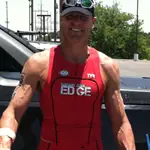
Terry Nugent knew he couldn't play football forever.
After a successful college football career at CSU (Colorado State University), and a brief stint in the NFL, Terry Nugent decided he would need a new challenge after his days on the gridiron came to a close.
Little did he know that challenge would come after watching the Ford Ironman Triathlon World Championships.
"I was watching the Ironman on television and I thought: 'One of these days, when I don't have a football body anymore, I'd sure like to do that,'" said Nugent.
Several years later, after starting a family and building a career in finance, Nugent completed his first half Ironman in 2001. "I went right to the heavy stuff."
More: 3 Basic Steps to a Faster Run
"I Couldn't Do It Alone"
The very next year, Nugent completed his first full Ironman in Germany, but it was not without its growing pains. "The wheels came completely off," he explained. "I didn't know what to expect."
Due to inadequate sodium intake before the race, Nugent developed hypernatremia on the course. "I felt like I was gonna die. I really and truly did. But I got it done."
Shortly after, a chance encounter at a triathlon seminar led Nugent to enlist the help of triathlon coach and six-time Ironman champion, Dave Scott. "I think he liked the fact that I had a football background, and I was previously 225 pounds and that I could muscle my way through this thing (triathlon)."
"There's Football Shape and Then There's Triathlon Shape"
But Scott gave Nugent a dose of reality and drastically changed his training regimen. "I remember the first time [Dave] took me through a weight workout," said Nugent. "Absolutely destroyed me."
Turns out the physical strength he built up over years of football didn't serve him quite as well in the sport of triathlon.
"Pound for pound, in terms of just lifting pure weight, I was stronger, but he just killed me with all the exercises he does. All the core stuff."
More: 5 Little Things That Make a Big Difference on Race Day
The Pain of Triathlon
Under Scott's direction, Nugent soon became a force to contend with in the Ironman distance. Unlike most triathletes, who find the swim portion of the race to be the most difficult, the run is the hardest for Nugent. "It always comes down to the run. You gotta be able to run off the bike. You gotta be able to have some back-end speed without falling apart."
To get through the runs, Nugent uses positive affirmations to keep him going, "I tell myself, ' I'm gonna go in the hurt locker here for a while, and it's okay. I trained for it, and I'm ready for it.'"
More: The Basics of Good Running Form
Gridiron Lessons
Nugent credits his mental toughness to his experience in professional sports. "If you think about professional sports, it's one of the only employment industries that they're always looking to replace you. They're always looking for somebody better."
This constant pressure to perform serves him well in a sport that demands excellence from its participants. "You have to be prepared both physically and mentally. That's your job. That's what you're being paid for," said Nugent.
"That mental toughness you develop as an athlete at the elite level, no question it carries forth to the sport of triathlon."
"There's Nothing Like It"
Looking back on his first Kona event, Nugent remarks, "That was an unbelievable feeling. And I was dead. I was absolutely dead."
But something about that post-race feeling seemed to inspire Nugent to stick with the sport of triathlon.
"I know it's crazy, but I actually love the soreness of triathlon," said Nugent. "Not like football, which can be debilitating. You're destroyed after a triathlon. And that just feels great. I guess us triathletes are just wired differently."
Whatever his "wiring" may be, Nugent shows no signs of slowing down, as he recently completed his tenth Ironman event. Not bad for somebody whose idea of a fast transition was once avoiding a 245-lb. linebacker.
More: 3 Workouts to Improve Your Run
 Search for your next triathlon.
Search for your next triathlon.
About the Author









Discuss This Article